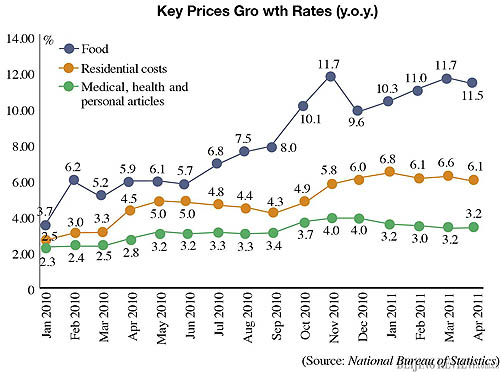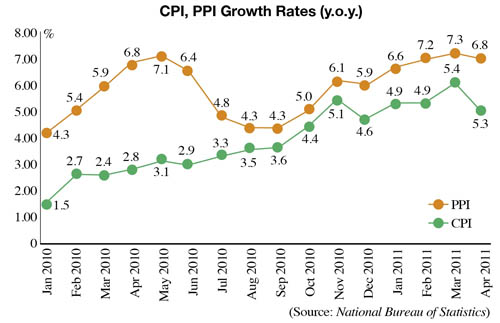|
Corporate reactions
To combat inflation, the People's Bank of China, the central bank, has adopted a tight monetary policy. Already the bank has raised the interest rate and the reserve requirement ratio several times this year. Guo Tianyong, a professor at the Central University of Finance and Economics, said the central bank's current policy will put pressure on companies, especially in terms of acquiring loans, and impose financial pressures that will only raise company costs.

As if financial difficulties weren't enough, increasing production costs have also hindered many companies' ambitions to expand or reap greater profits. In the first quarter this year, workers' salaries increased 10-20 percent, and the purchasing prices of raw materials by industrial producers increased 10.2 percent. According to Ministry of Industry and Information Technology figures, prices of some important raw materials have been increasing, supplies of raw materials are scarce and the costs of land, labor and capital are increasing, imposing previously unforeseen burdens on business operations.
Price hikes of raw materials has brought marked changes to corporate behaviors—in some instances companies have been hesitant to accept new orders. In an extreme case, some Chinese exporters have rejected orders from mega store Walmart and other foreign retail chains because their selling prices are too low, as are the Chinese companies' profits in these sales.
Facing long-term inflation expectations, some companies are simply raising product prices. According to NBS figures, in the first quarter the producer price index (PPI) rose 7.1 percent year on year and in April the index rose 6.8 percent.
However, both economists and consumers are questioning these price increases. CASS Vice President Chen Jiagui said enterprises should shoulder their responsibilities, continue to promote stable and fast consumption growth and stimulate domestic demand. For now, companies should appropriately reduce their expectations of profits. Large state-owned enterprises, in particular, should stabilize their prices.
Labor-intensive companies in China's coastal areas have moved their factories to underdeveloped areas in central and west China to reduce production costs. According to the figures released by the Fujian Provincial Development and Reform Commission, the province's textile companies have been busy establishing factories in Henan Province and Chongqing Municipality. By making the move inland but keeping its headquarters in Fujian, the company has been able to save 10-20 percent on production costs.
Government actions
With controlling price hikes at the top of its list, the Chinese Government has adopted various measures to act quickly and efficiently against inflation.

On May 18, the central bank raised the reserve requirement ratio, the fifth this year. The reserve requirement ratio for large banks now sits at 21 percent, a record high. On April 6, the central bank also raised the interest rate for the second time this year, intensifying market expectations for tighter monetary supplies. Industrial insiders expect these rates to be increased further if inflation is not alleviated soon.
The National Development and Reform Commission (NDRC) has also started asking companies and industrial associations to stabilize product prices. At the end of March market rumors abounded that four major cleaning and household producers—P&G, Unilever, Liby Group and Nice Group—were planning to raise prices of their products as of April 1. The NDRC was quick to act, summoning heads of the companies and requesting them to refrain from such increases. On March 31, NDRC's Department of Price criticized both the China National Association for Liquor and Spirits Circulation and China Alcoholic Drinks Industry Association for increasing liquor prices and requested the liquor industry to stabilize prices for the first half of this year.
The Ministry of Commerce (MOFCOM) has strengthened efforts to increase effective market supplies. At a press conference on April 19, MOFCOM spokesman Yao Jian said that while inflation expectations do exist, the major task of the ministry is to secure market supplies.
| 